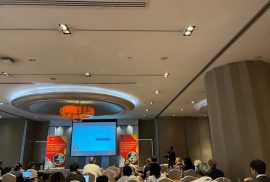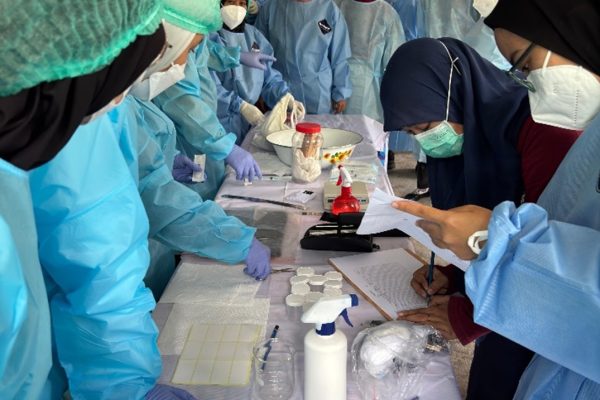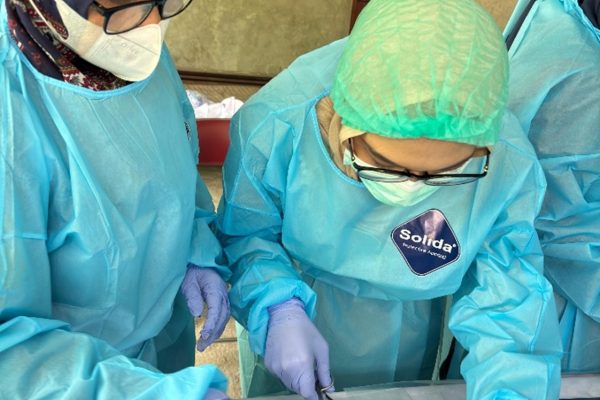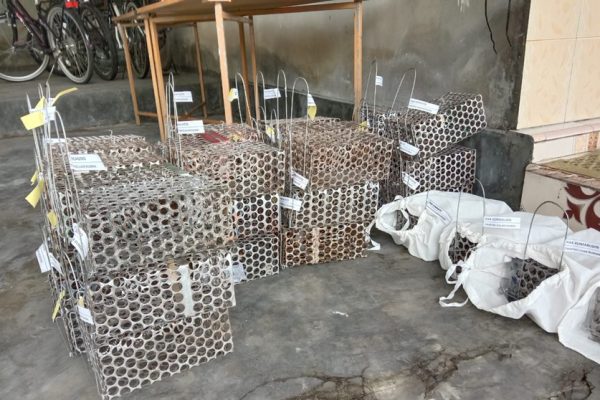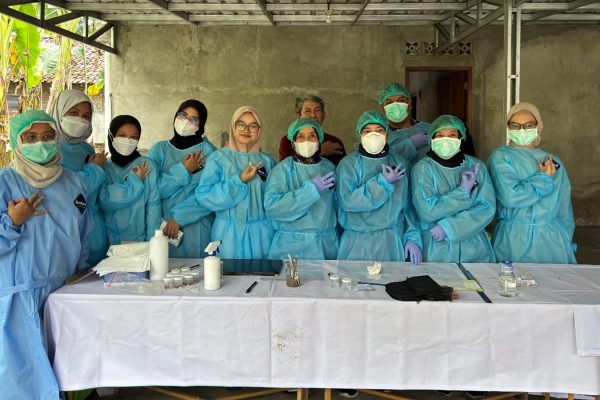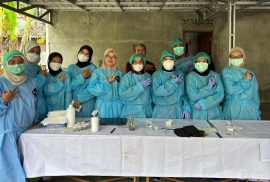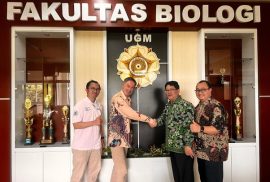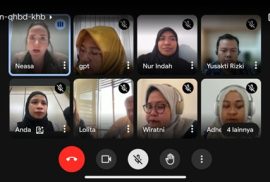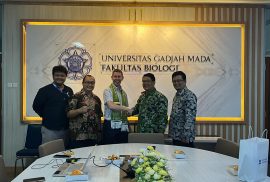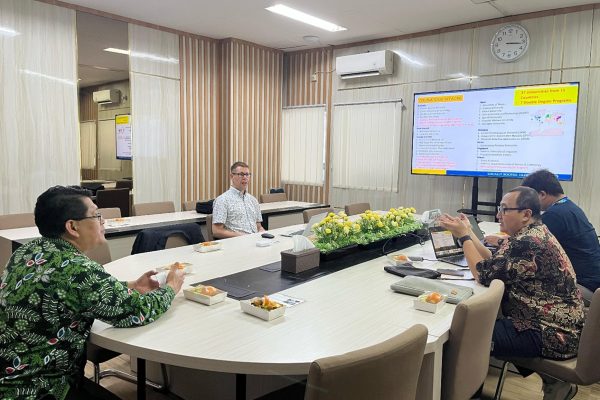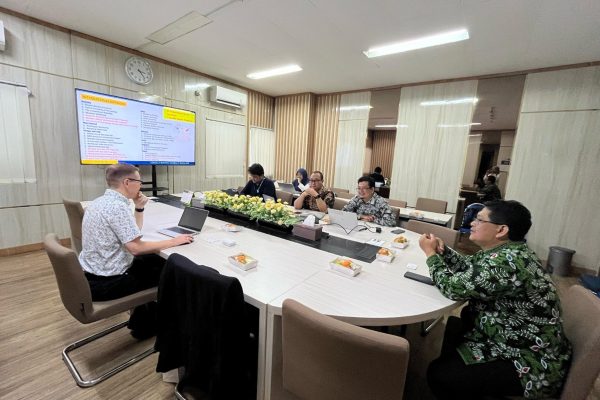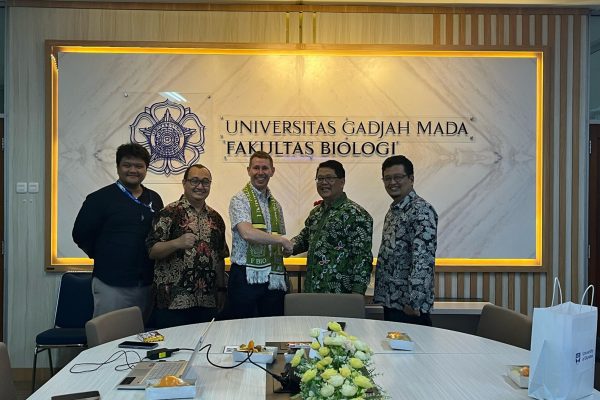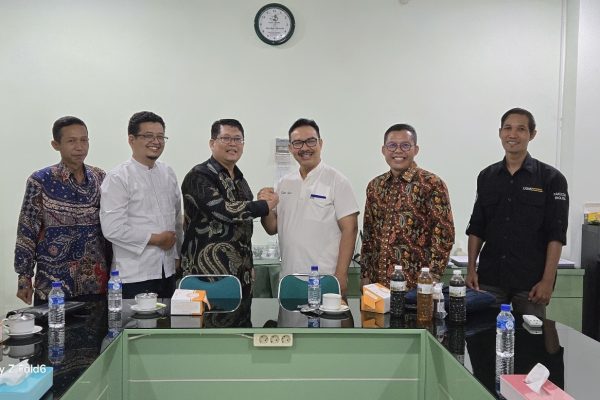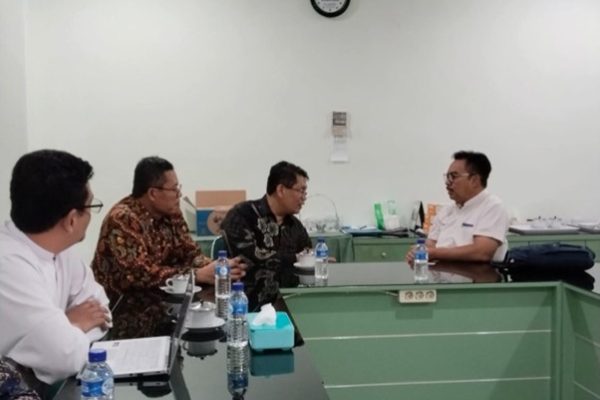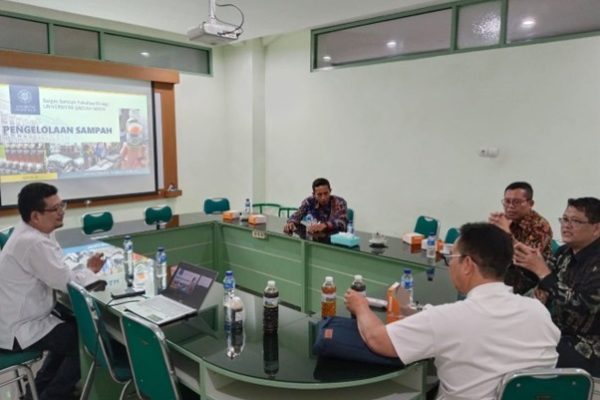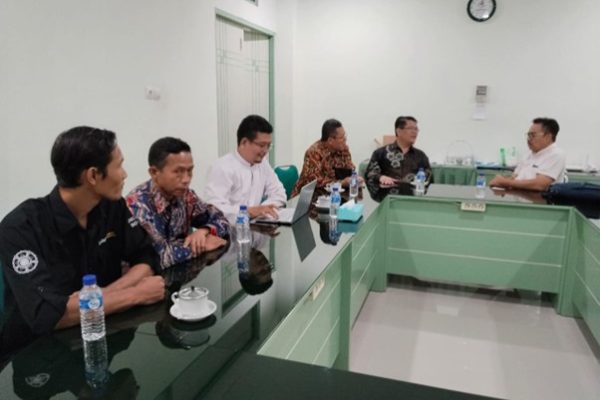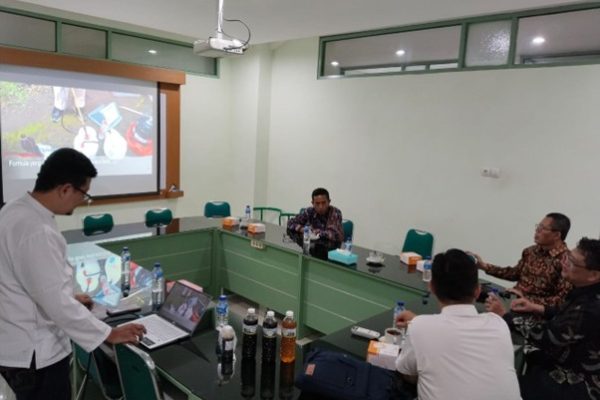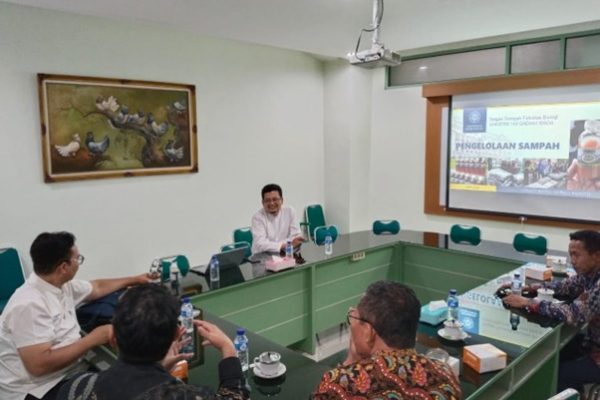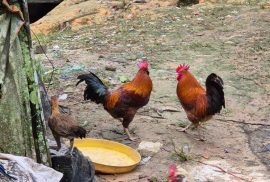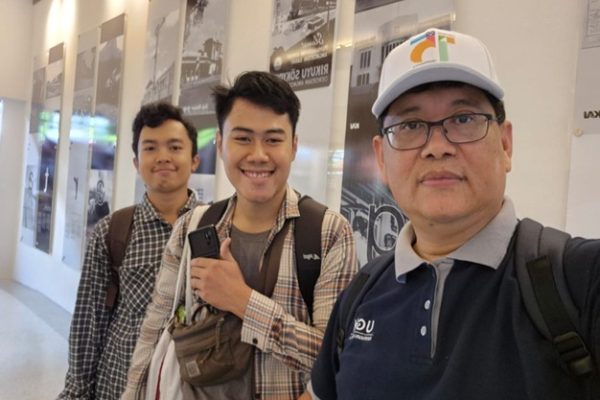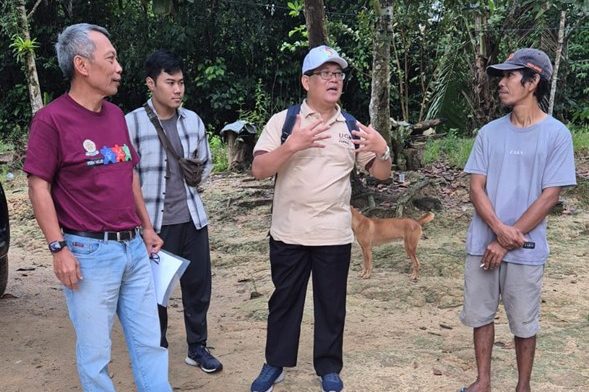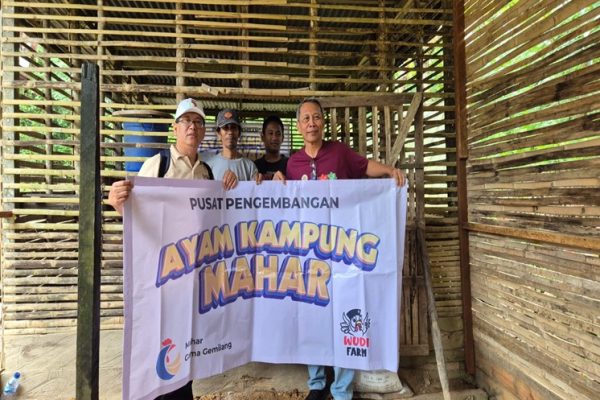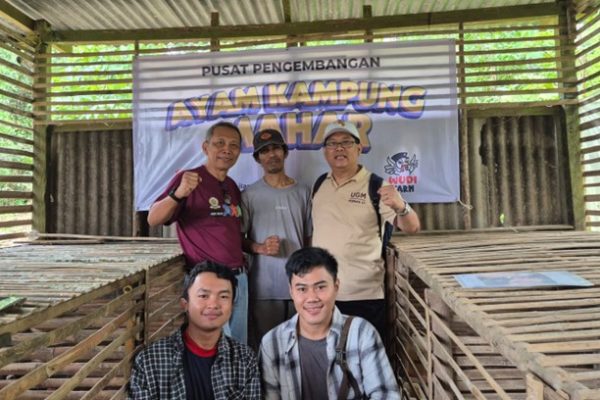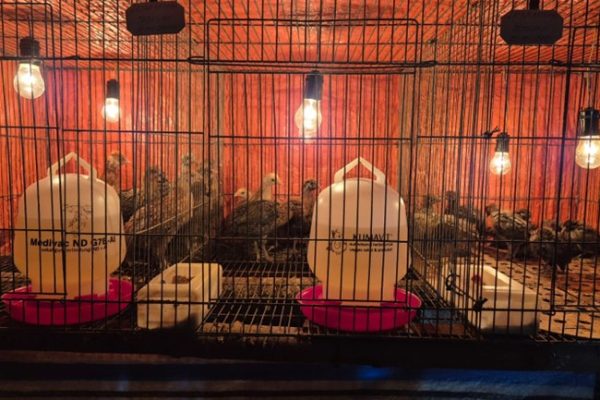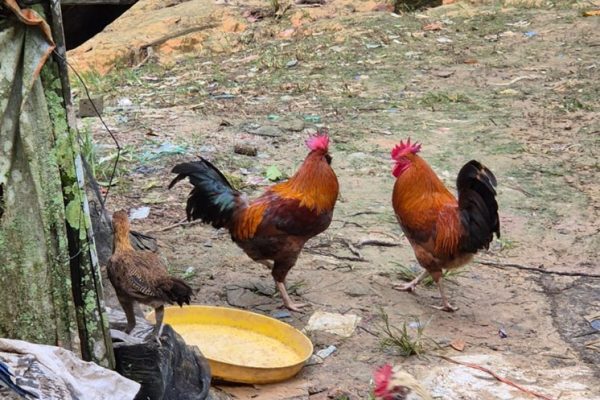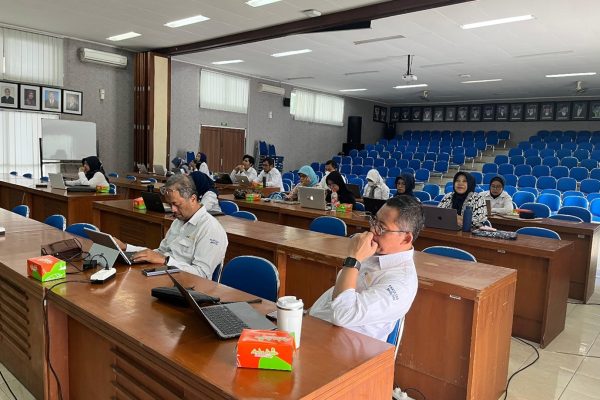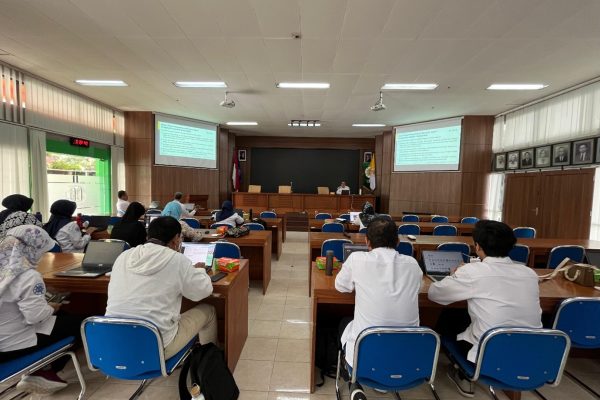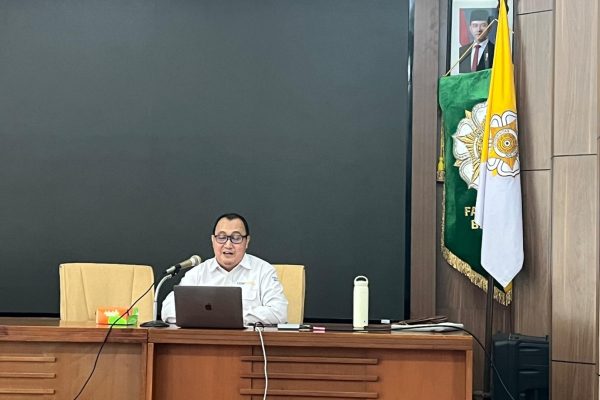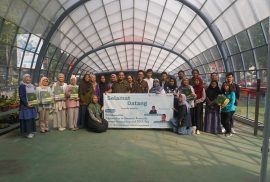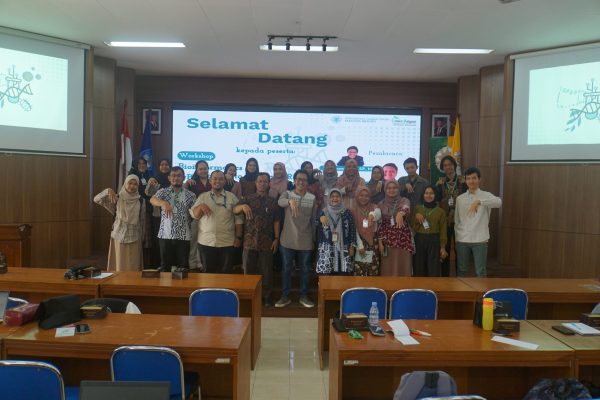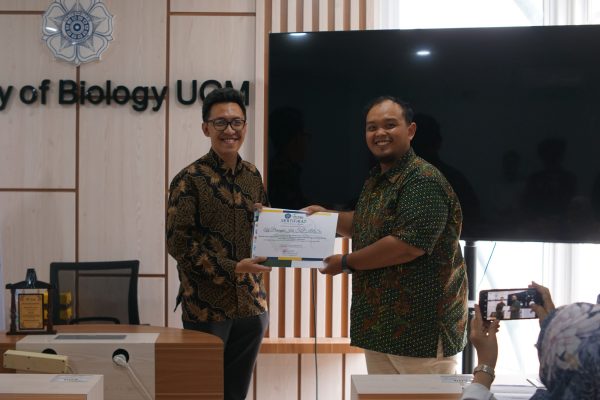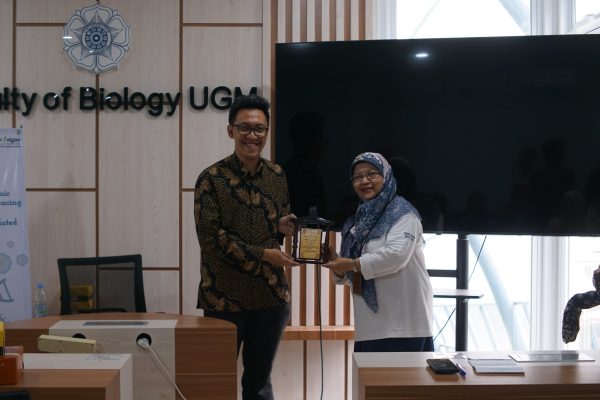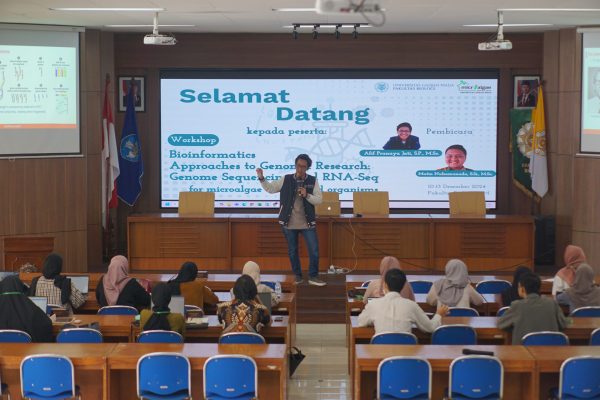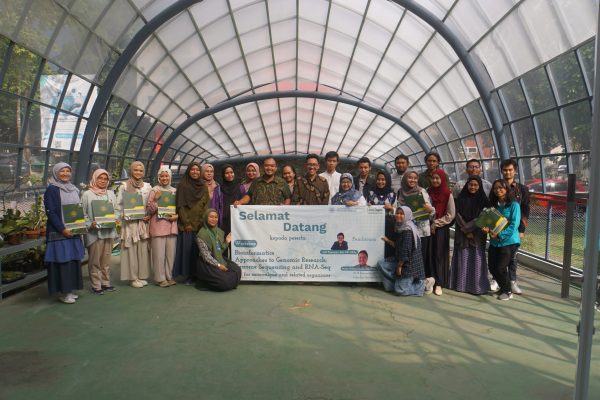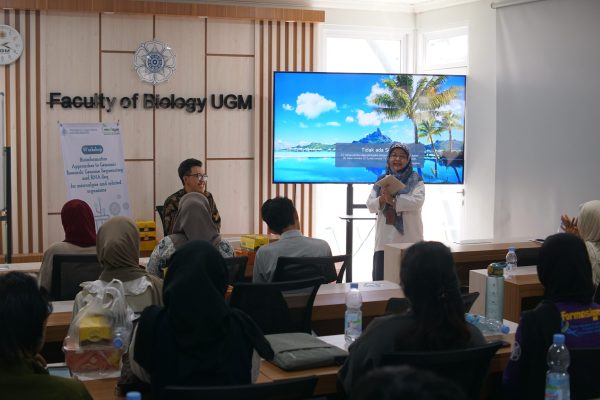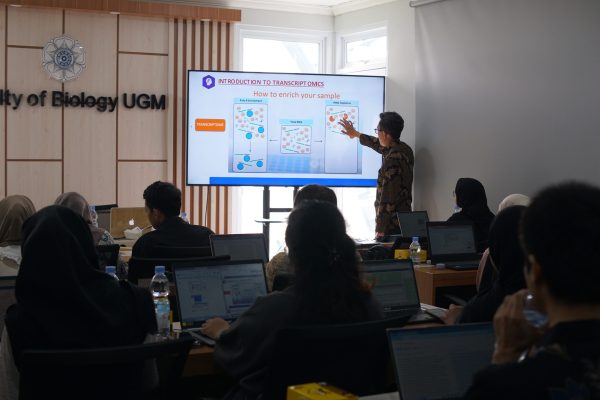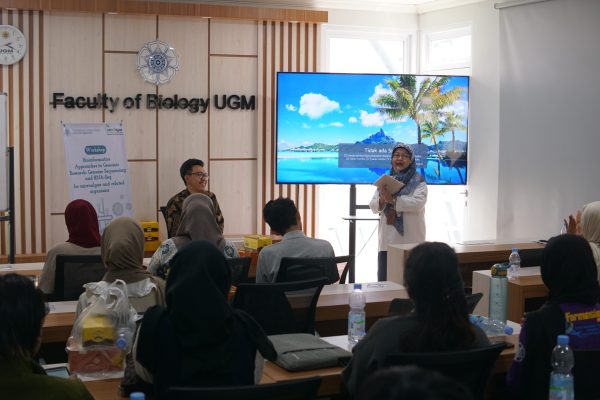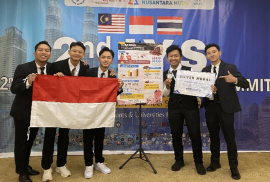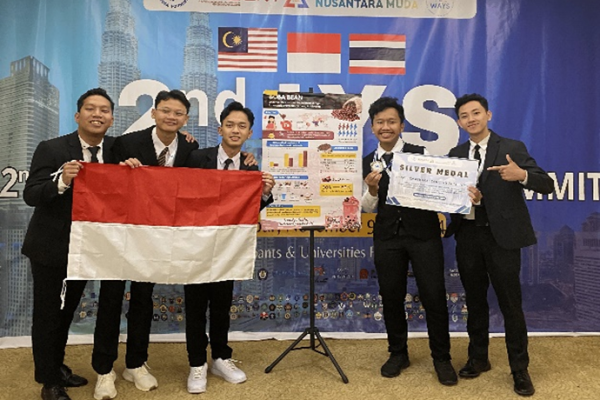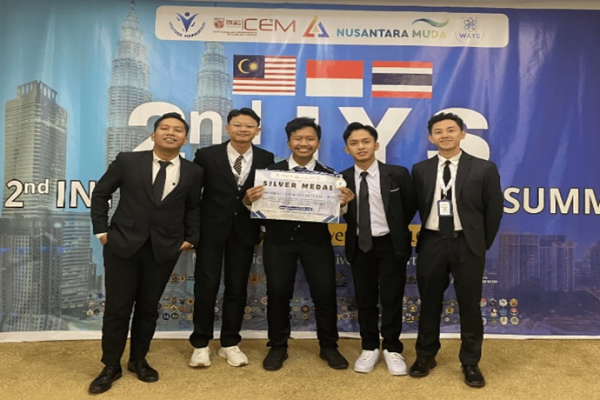Arsip:
SDGs 16 : Guarantee Peace
Two lecturers from Faculty of Biology Universitas Gadjah Mada (UGM); Dr. Luthfi Nurhidayat and Dr. Tri Rini Nuringtyas showcased Indonesia’s growing contributions to biomedical research at The 2025 Asian Conference on Fish Models for Diseases, held from February 17–19 in Bangkok, Thailand. This conference was joined by leading scientists from across Asia and beyond in sharing advancements in the use of fish as model organisms for disease research.
Dr. Luthfi Nurhidayat delivered an oral presentation titled “Indonesia’s Native Fish: From Aquaculture Towards Biomedical Research,” highlighting the untapped potential of the native Rasbora lateristriata (commonly known as wader pari) as an alternative model organism. Initially studied for aquaculture, R. lateristriata shows promise in biomedical applications due to its fast embryonic development, resilience to warm temperatures, and its suitability for natural compound testing—an area in which Indonesia holds vast potential.
In a flash poster session, Dr. Tri Rini Nuringtyas presented her study titled “Antidiabetic Potential of Gyrinops versteegii Agarwood Leaf Extract in Zebrafish Models.” Her research demonstrates the efficacy of agarwood leaf extract as a potential antidiabetic agent, successfully tested using zebrafish.
This international engagement is part of UGM’s efforts to support the United Nations Sustainable Development Goal (SDG) 3: Good Health and Well-being. Participation in the conference strengthens Indonesia’s presence in fish-based biomedical research and opens doors for international collaboration in health-related model development.
Bantul, Indonesia – February 19, 2025 – In a proactive public health initiative, students from the Faculty of Biology, Universitas Gadjah Mada (UGM) collaborated with the Bantul District Health Office and the Yogyakarta Public Health Laboratory Center (BBLABKESMAS) to conduct rodent surveillance in Beran Hamlet, Canden Village, Jetis Subdistrict, Bantul Regency. This joint effort was initiated following confirmed human cases of leptospirosis and hantavirus in the area, with the infections suspected to have also affected other family and community members.
The surveillance began on Tuesday, February 18, with the placement of 50 single-live rat traps. As a result, nine traps captured rats (Rattus spp.) and two traps captured Asian house shrews (Suncus murinus), both considered potential reservoirs of disease.
The student research team comprised Dita Dwi Putri, Zahwa Khoirun Nisa, Dhiyaa Sekar Hanum, Shaila Revita Zahra, and Trissa Amalia Putri and Rizky Nur Endah Sari. Their participation is part of the Merdeka Belajar Kampus Merdeka (MBKM) Research Program, supervised by Dr. Dra. Rr. Upiek Ngesti Wibawaning Astuti, B.Sc., DAP&E, M.Biomed.
Moving forward, molecular analysis will be conducted on the captured specimens to detect the presence of Leptospira bacteria and hantavirus, providing crucial data to inform future public health responses. This initiative reinforces the Faculty of Biology UGM’s dedication to community welfare and aligns with Sustainable Development Goals (SDGs), including SDGs No 3: Good Health and Well-being, SDGs No 4: Quality Education, SDGs No 15: Life on Land, and SDGs No 17: Partnerships for the Goals.
Yogyakarta, 14 February 2025 – Faculty of Biology, Universitas Gadjah Mada (UGM) and Faculty of Science, Leiden University, celebrate a decade of academic and research partnership which has had a major impact on the development of biological science. Prof. dr. Herman Spaink from the Faculty of Science Leiden University, visits Faculty of Biology to celebrates their collaboration together with the Dean of the Faculty of Biology UGM, Prof. Dr. Budi Setiadi Daryono, M.Agr.Sc. and Vice Dean for Research, Community Service, Collaboration and Alumni Affairs, Dr. Eko Agus Suyono, M.App.Sc. along with Dr. Luthfi Nur Hidayat, S.Sc., M.Sc., lecturer at of Faculty of Biology as well as alumnus of Leiden University.
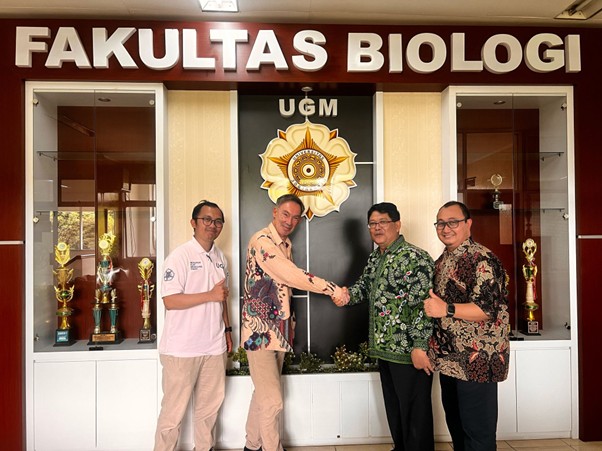
Since the collaboration began in 2015, Faculty of Biology UGM and Leiden University have carried out various joint research projects, student and lecturer exchange programs, as well as international scientific publications. Ultimately, in September 2024, Faculty of Biology UGM and the Graduate School, Faculty of Science, Leiden University signed a Joint Doctoral Degree Agreement. This program allows students from both universities to earn a doctoral degree with guidance from experts at both institutions. This agreement confirms the commitment of both institutions to strengthening academic and research relations in the field of biology.
Apart from that, the two universities also collaborated in establishing the Zebrafish Research Facility. This facility is expected to become an international research center to support the development of research in the health and natural products potential from Indonesia. This collaboration is in line with UGM’s vision of developing superior research in the fields of biotechnology and public health.
With a decade of success under their belt, both institutions are committed to continuing to expand the impact of research and innovation at the global level while strengthening their role as centers of excellence for biological research. It is hoped that this collaboration will continue to produce collaborative programs, student exchanges, joint research and quality scientific publications, providing significant benefits to the academic community and wider society.
This collaboration also contributes to achieving the Sustainable Development Goals (SDGs). In particular, SDG 4 (Quality Education) which supports access to quality education at the global level, SDG 9 (Industry, Innovation, and Infrastructure) where the development of research facilities and scientific innovation in the field of biotechnology supports the progress of research infrastructure at the international level, and SDG 17 (Partnerships for the Goals) where collaboration between UGM and Leiden University reflects the importance of global partnerships in supporting research, innovation and academic development. Thus, this collaboration not only strengthens academic and research networks, but also contributes to achieving broader sustainable development goals.
Yogyakarta, 13 February 2024 – Faculty of Biology, Universitas Gadjah Mada (UGM) participated in discussions to initiate collaboration with University College Cork (UCC), Ireland. This discussion was led by the Secretary of the Directorate of Global Partnerships and Relations at UGM, Prof. Ir. Wiratni, S.T., M.T., Ph.D., IPM, and attended by delegates from various faculties at UGM, including the Faculty of Biology, Faculty of Pharmacy, Faculty of Mathematics and Natural Sciences (MIPA), and Faculty of Agricultural Technology. The Faculty of Biology delegation was represented by Nur Indah Septriani, Ph.D., as Head of the International Affairs Office of the Faculty of Biology.
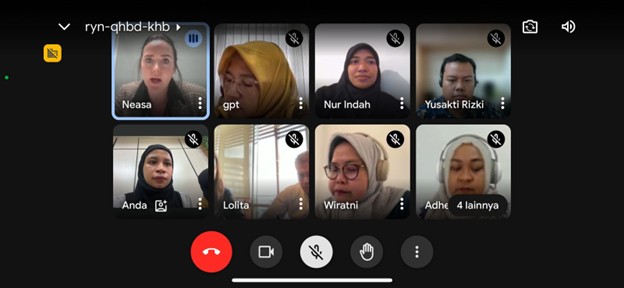
Ms. Neasa O’Connor, International Recruitment Manager College of Science, Engineering and Food Science UCC, conveyed the potential for collaboration between the UGM Faculty of Biology and the UCC School of Microbiology. On this occasion, UCC offers two master’s program schemes, regular and by research, as part of the initiation of a double degree program with the Biology Master’s program at UGM. Ms. Neasa highlighted the potential for double degree collaboration in the Master of Microbiome Science program, a new study program at UCC, as well as other master’s programs such as the Master in Bioinformatics and Master in Biotechnology and Industrial Sciences.
Nur Indah Septriani, Ph.D., expressed her appreciation and welcomed the initiation of collaboration with UCC. She mentioned that the Faculty of Biology UGM has established double degree collaborations with various world universities at undergraduate level through the International Undergraduate Program (IUP), as well as at master’s and doctoral levels. Apart from that, she also offers the potential for collaboration in annual international programs organized by the Faculty of Biology UGM, such as the International Summer Course (ISC) and the International Conference on Biological Science (ICBS).
This discussion is a strategic step in strengthening academic relations between the Faculty of Biology UGM and University College Cork, Ireland. The initiation of this collaboration is in line with the Sustainable Development Goals (SDG 4) which aims to improve access and quality of higher education through international academic collaboration. Apart from that, this collaboration also supports SDG 17, which emphasizes the importance of partnerships between educational institutions in creating a positive impact on the development of science and human resources at the global level.
Yogyakarta, 14 February 2025 – The Faculty of Biology, Universitas Gadjah Mada (UGM) received a visit from delegation from the University of Dundee, United Kingdom, in order to discuss the follow-up to academic cooperation between the two institutions. The University of Dundee delegation was represented by Dr. Christine Graham as Academic Regional Lead for South East Asia and Associate Dean for Student Recruitment and Global Partnership, School of Life Science. This visit took place in the KPTU Meeting Room, Faculty of Biology UGM and was also attended by Prof. Dr. Budi Setiadi Daryono (Dean of the Faculty of Biology UGM), Dr. Eko Agus Suyono (Vice Dean for Research, Community Service, Collaboration and Alumni Affairs), Sukirno, Ph.D. (Head of the Undergraduate Study Program), and Matin Nuhamunada, Ph.D. (Secretary of the Office of International Affairs, Faculty of Biology, UGM).
Since 2024, the Faculty of Biology together with several other faculties at UGM have established double degree collaboration with the University of Dundee, especially in the biology master’s program through the School of Life Science. This program is supported by various scholarship schemes, including the LPDP scholarship by the Ministry of Finance of the Republic of Indonesia as well as various other scholarships offered by the University of Dundee.
During this visit, Dr. Graham further introduced the University of Dundee, especially the School of Life Science, by explaining various student activities, campus facilities, and research focused in the field of Cell and Molecular Biology. This session was followed by a presentation from Dr. Eko Agus Suyono who introduced the Faculty of Biology UGM to the University of Dundee delegation.
Prof. Dr. Budi Setiadi Daryono welcomed this discussion and emphasized the commitment of the Faculty of Biology UGM in supporting international academic collaboration. He highlighted the high interest of students to continue their education abroad as well as the various scholarship opportunities available. Apart from that, Prof. Budi also mentioned that several students from the International Undergraduate Program (IUP) Faculty of Biology UGM are currently undergoing a double degree program at the University of Leeds, United Kingdom, and the Australian National University, Australia.
The discussion also included the potential for developing an Academic Validation Program, an inter-university curriculum validation program that allows students to obtain degree recognition from the University of Dundee without having to attend lectures directly. This program is expected to run continuously with the initiation of the 4+1 (Undergraduate-Master) scheme. In addition, Matin Nuhamunada, Ph.D. adding that the University of Dundee has the opportunity to participate in the Faculty of Biology UGM’s annual international agenda, such as the International Summer Course (ISC) and the International Conference on Biological Science (ICBS).
This visit is a strategic step in strengthening relations between the Faculty of Biology UGM and the University of Dundee. This follow-up discussion is in line with the Sustainable Development Goals which encourage increasing access and quality of higher education through international academic collaboration (SDG 4) and emphasizes the importance of synergy between educational institutions in creating a positive impact on the development of science and human resources at the global level (SDG 17).
On January 31, 2025, a delegation from the Waste Management Task Force of the Faculty of Biology at Gadjah Mada University (UGM) met with the newly elected Mayor of Yogyakarta, Dr. Hasto Wardoyo, Sp.OG (K), to discuss potential collaborations for waste management in the city. The meeting took place in Meeting Room IV F at Sadewa Hospital, where both parties expressed their commitment to addressing the pressing waste management issues facing Yogyakarta.
The delegation from UGM included prominent figures such as Prof. Dr. Budi Setiadi Daryono, the Dean of the Faculty, Dr. Slamet Widiyanto, M.Sc., the Vice Dean for Finance and Human Resource, Sukirno, S.Si., M.Sc., Ph.D., the Head of the Task Force, and other members including Mr. Suharjita and Mr. Heru. The meeting aimed to explore collaborative efforts to enhance environmental sustainability and improve agricultural productivity through effective waste management strategies.
Mayor Hasto highlighted the alarming statistic that Yogyakarta generates approximately 300 tons of waste daily, necessitating serious management from upstream to downstream. He emphasized the importance of implementing clean technologies and innovative solutions to tackle this issue, which directly impacts food security and the overall health of the local ecosystem.
During the discussion, the Mayor introduced his vision for the “One Village One Sister University” and “One Village One Sister Company” programs. These initiatives aim to empower local communities by fostering partnerships with educational institutions and businesses to create sustainable waste management practices. The collaboration with UGM’s Faculty of Biology is expected to play a crucial role in this endeavor.
The UGM delegation proposed the application of various technological products, including probiotic solutions and organic fertilizers like BIOFERTI, which have been developed to address the challenges posed by organic waste. These products not only help in waste reduction but also enhance soil health and agricultural productivity, contributing to food security in the region.
The meeting also focused on the importance of ecosystem protection and the need for a comprehensive approach to waste management that considers environmental impacts. The UGM team emphasized the significance of educating the community about waste segregation and the benefits of using clean technologies in daily practices.
Both parties agreed on the necessity of conducting further research and pilot projects to assess the effectiveness of the proposed solutions. The collaboration aims to create a model for sustainable waste management that can be replicated in other cities facing similar challenges.
As the meeting concluded, Mayor Hasto expressed his gratitude for the UGM delegation’s commitment to environmental issues and their willingness to collaborate. He reiterated that effective waste management is not just a municipal responsibility but a collective effort that requires the involvement of all stakeholders, including academia, government, and the community.
The partnership between UGM’s Faculty of Biology and the Yogyakarta city government marks a significant step towards achieving the Sustainable Development Goals (SDGs), particularly in areas related to environmental sustainability, food security, and community empowerment. The collaboration is expected to yield innovative solutions that will benefit both the city and its residents in the long run.
The Faculty of Biology, Universitas Gadjah Mada (UGM), through its flagship Gama Ayam research program, has launched a collaborative initiative to promote egg self-sufficiency in Indonesia. In partnership with KAGAMA East Kalimantan and local poultry farmers, the team is cultivating the MAHAR village chicken in Balikpapan, one of the buffer zones of the future capital city, IKN Nusantara.
This initiative is a direct application of UGM’s research innovation. The MAHAR chicken strain originally developed at UGM’s Sawitsari Research Station has been the subject of continued research and refinement under the leadership of Prof. Dr. Budi Setiadi Daryono, M.Agr.Sc., Head of the Gama Ayam Research Team. The cultivation activities include egg collection, hatching, brooding, selection, and breeding to develop a robust and productive indigenous laying chicken strain.
Drs. Lalu Fauzul Idhi, representing KAGAMA East Kalimantan, has played a key role in facilitating regional collaboration. Local farmers, including Mr. Sultan and his team, have already shown promising results, successfully raising the MAHAR chickens to the hundreds in a short period.
To assess progress, the Gama Ayam team visited the Balikpapan site on February 12, 2025, represented by Prananda Imammuddin Dzaki, Yusuf Febrianta, and Prof. Budi. The visit focused on genetic monitoring, performance evaluation, and knowledge sharing related to hatching success and reproductive development.
This program support Sustainable Development Goals (SDGs), especially SDGs No.8 on Decent Work and Economic Growth, by promoting village-based poultry farming; SDGs No.11 on Sustainable Cities and Communities, through local food production initiatives;and SDGs No 17 on Partnerships for the Goals, via committed collaboration between academia, alumni, and the farming community.
The MAHAR chicken is projected to become Indonesia’s leading egg-laying village chicken strain, contributing significantly to Indonesia’s food resilience and rural economic empowerment.
Monday, January 23, 2025 – The Faculty of Biology, Universitas Gadjah Mada (UGM), held a workshop titled “Master Plan for Research and Community Service of the Faculty of Biology 2024-2028”. The event took place from 9:00 AM to 11:00 AM WIB at the Auditorium Biologi Tropika, Faculty of Biology UGM.
The workshop was led by Dr. Eko Agus Suyono, M.App.Sc., Vice Dean for Research, Community Service, Collaboration, and Alumni. In his opening remarks, Dr. Eko emphasized the importance of the Faculty of Biology’s continuous contribution on the global stage.
“Communication and collaboration are the keys to becoming part of the global community. We must also keep up with the dynamic changes in the world,” he said.
“Communication and collaboration are the keys to becoming part of the global community. We must also keep up with the dynamic changes in the world,” he said.
The event was attended by the Dean, Vice Deans, all Heads of Laboratories, and the team of lecturers responsible for drafting the Master Plan for Research and the Master Plan for Community Service at the Faculty of Biology UGM. The workshop covered the fundamentals of master plan development, including the roadmap, development principles, implementation objectives and targets, strategic programs, and performance goals set for 2024–2028.
The Dean of the Faculty of Biology UGM, Prof. Dr. Budi Setiadi Daryono, M.Agr.Sc., also delivered his directives. He highlighted the importance of focusing on performance targets and optimizing available resources.”We must concentrate on achieving our targets and ensure the optimal management of our resources,” Prof. Budi emphasized.
The workshop aimed to develop a strategic plan for the Faculty of Biology UGM for the next five years, aligning with the university’s vision and mission. With this master plan, the Faculty of Biology is expected to enhance its contribution to research and community service, both nationally and internationally.
The Microalgae Study Group, the Biotechnology Laboratory, Faculty of Biology, Universitas Gadjah Mada (UGM), successfully conducted a Bioinformatics Workshop titled “Bioinformatics Approaches to Genomic Research: RNA-Seq and Genome Sequencing”. The workshop was held from December 10 to December 13, 2024, and was attended by 17 participants, including lecturers, students, and professionals.
The workshop’s featured Afif Pranaya Jati, S.P., M.Sc., a Ph.D. candidate in the Department of Microbiology, Monash University, Australia as main speaker. The event aimed to provide participants with a comprehensive understanding of bioinformatics techniques for analyzing genomic and transcriptomic data. Participants were introduced to advanced methodologies for RNA-Seq data analysis, genome sequencing, gene mining, and hands-on application of bioinformatics software tools.
The workshop was officially opened on Friday, December 10, 2024, by the Head of the Tropical Biology Department, Abdul Razaq Chasani, S.Si., M.Si., Ph.D., at the Tropical Biology Auditorium, Faculty of Biology, UGM. The first day focused on theoretical aspects, including sampling techniques and sequencing quality control (QC), delivered by the primary speaker. Additional sessions included an online lecture by Matin Nuhamuda, S.Si., M.Sc., Ph.D., a lecturer from the Biotechnology Laboratory, Faculty of Biology, UGM, on the topic “Genome Mining—From Data to Insight.”
On the second day, participants explored the basics of sequencing and its application to metagenomics. The third day covered an introduction to whole-genome sequencing (WGS) and the interpretation of resulting data. On the final day, participants focused on RNA sequencing and data interpretation. Practical sessions utilized data from the NCBI database and real-time data interpretation by participants. Analyses were performed using the Galaxy EU platform, a web-based bioinformatics data analysis tool from Europe that is freely accessible.
The workshop concluded with remarks from Prof. Endang Semiarti and Dr. Eng. Thoriq Teja Samudra. Prof. Endang highlighted the workshop’s critical role in enhancing bioinformatics analytical skills, which are increasingly in demand. She expressed hopes for similar activities to be conducted in the future.
This workshop aimed to expand participants’ knowledge of genomic research across diverse fields such as health, agriculture, and biotechnology. The event aligned with Sustainable Development Goal (SDG) 4 on Quality Education by fostering excellence in human resource development through education. It also served as an approach to studying the biodiversity of life forms, contributing to SDG 14 (Life Below Water) and SDG 15 (Life on Land).
Kuala Lumpur, Malaysia – A team of students from the Faculty of Biology, Universitas Gadjah Mada (UGM), comprising Muhammad Faris Khiar Calosa and Ridho Nur Alam, successfully secured a silver medal at the International Youth Summit 2024. The prestigious international essay competition took place on November 9-10, 2024, at Universiti Putera Malaysia, Malaysia, where hundreds of participants from various countries showcased their innovations across multiple categories.
The UGM Biology team competed in the Food category, presenting Boba Bean: An Innovative Instant Red Bean Beverage for Anemia Prevention Among Adolescents. This innovative idea captivated the international panel of judges through its creative approach, combining a science-based nutritional solution with current food trends popular among adolescents.
Through meticulous preparation and interdisciplinary collaboration with team members from the Faculties of Cultural Sciences, Engineering, and Pharmacy, the UGM team stood out among competitors, earning this prestigious recognition.
Through meticulous preparation and interdisciplinary collaboration with team members from the Faculties of Cultural Sciences, Engineering, and Pharmacy, the UGM team stood out among competitors, earning this prestigious recognition.
The Boba Bean offers an instant red bean-based beverage rich in plant-based iron and designed to appeal to younger generations who enjoy trendy beverages. By utilizing natural ingredients such as red beans, tapioca flour, and coconut sugar, this product provides a practical solution for increasing daily iron intake and preventing anemia, particularly among adolescent girls who face a high prevalence of this condition. Beyond its nutritional benefits, Boba Bean also excels in flavor and texture, aligning with the preferences of today’s youth.
This achievement highlights not only the research quality of UGM Biology students but also the ability of Indonesia’s younger generation to contribute meaningful solutions to global challenges through relevant and impactful innovations. Specifically, this project supports the achievement of the Sustainable Development Goals (SDGs), particularly SDG 2: Zero Hunger, by offering a nutritious food alternative to prevent anemia, and SDG 3: Good Health and Well-Being.
[Writer: Ridho Nur Alam]

